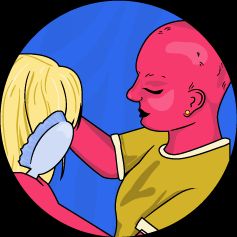Hair is an ultra-personal method of self-expression. Since it’s so closely tied to confidence and self-esteem, it makes total sense that losing hair can have an impact on your quality of life.
For people diagnosed with alopecia areata — an autoimmune disorder that causes partial or full hair loss on the scalp or other parts of the body — mental well-being is important to think about.
Alopecia areata and mental health go hand in hand. One can trigger the other or make it worse, and vice versa.
Read up on the connection between mental health and alopecia areata below and learn where you can go for help if the condition is impacting you or someone you love.
Yes, alopecia areata can affect mental health. But this also depends a lot on the individual.
Hair is an intimate part of your body that plays a huge role in your physical appearance. Many people use hair as a way to show off their personal brand.
While hair loss from alopecia areata isn’t painful, symptoms can go beyond physical. Alopecia areata might lead to:
- feelings of grief or loss
- isolation or withdrawal from others
- changes in performance at school and work
- embarrassment
- anger
- self-blame
- guilt over the secondary effects it may have on friends and family
Living with a chronic condition like alopecia areata can also make you more prone to developing depression, according to the National Alopecia Areata Foundation (NAAF).
In fact, one study found that people with alopecia areata were actually more likely to be diagnosed with a new mental health condition after their alopecia diagnosis.
Depression or anxiety don’t directly cause alopecia areata, but they can worsen it.
Both conditions can put your body under enormous stress. Stress can make alopecia areata worse, contributing to cycles of hair loss and regrowth.
That’s because alopecia areata is an autoimmune disease. Stress is a known culprit when it comes to the development and severity of these types of conditions.
The most common triggers of alopecia areata are stressful events, trauma, and acute anxiety. That’s why minding your mental health — stress especially — is important as you manage alopecia over the long term.
If you find that hair loss from alopecia areata is taking a toll on your emotional well-being, know that there are steps you can take to help feel like yourself again.
- Mindful lifestyle techniques: Mixing a few mindful moments into your days might help you manage the mental health impacts of alopecia areata. Relaxation techniques, yoga, and mindfulness can all be useful in keeping stress levels low.
- Exercise: Studies show that staying physically active has a positive impact on people diagnosed with alopecia areata, resulting in improved mental health status.
- Support groups: Knowing you’re not alone in something can help with feelings of isolation. Even your most supportive friends probably won’t get what it’s like to have alopecia unless they’ve also had it. A support group is a great way to connect with people who’ve been there and done that.
- Therapy: Medication, talk therapy, or a combination of the two are usually the plan of action when you have a diagnosed mental health condition. Talk therapy can help you cast off negative thinking, work through relationship issues, and cope with stressful life experiences like hair loss. It can be done individually, online, or in group settings.
Remember, one size does not fit all. You might have to push through a bit of trial and error before you find the things that give your mental health the biggest boost.
Maintaining good mental health can play a major role in successfully managing alopecia areata, since keeping stress low can help prevent symptoms from worsening.
Here are a few examples of how you can make mental health a priority in your life:
- Set realistic and achievable goals for yourself that work alongside your life, symptoms, and mental health needs.
- Learn about depression and/or anxiety and how it’s connected to alopecia areata.
- Talk with your doctor about mental health symptoms of alopecia areata, as well as the physical.
A strong support system can lift you up and help you stay on track after you’ve been diagnosed with alopecia areata. Lean on your loved ones when you’re having hard days.
You can also visit the NAAF for a vast library of online resources. Their website can direct you to support group meetings in your area, mentorship and advocacy programs, and information to help you learn more about the condition.
Alopecia areata can impact your mental health. For many, the emotional symptoms of the condition are even more impactful than the physical ones.
Whether or not you decide to try hair loss treatments, don’t forget to make mental health a priority. Just because alopecia areata itself isn’t physically painful doesn’t mean the emotional effects aren’t real, measurable, and treatable.
When you’re in need of mental health support, reach out to your loved ones and healthcare team. They can help you decide which methods to try, from mindful lifestyle techniques to therapy.
Above all, remember to be kind to yourself and take it one step at a time.

